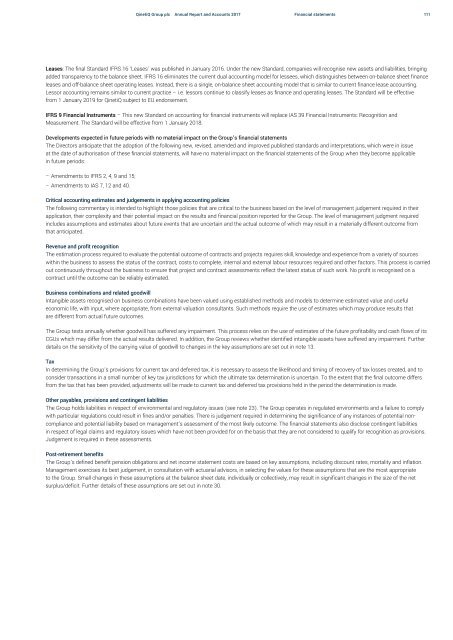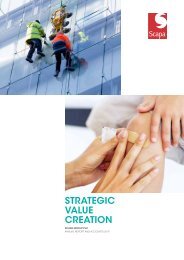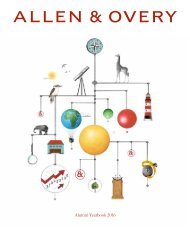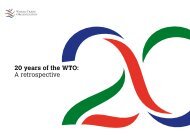QinetiQ Annual Report 2017
Create successful ePaper yourself
Turn your PDF publications into a flip-book with our unique Google optimized e-Paper software.
www.qinetiq.com<br />
<strong>QinetiQ</strong><br />
<strong>QinetiQ</strong> Group<br />
Group<br />
plc<br />
plc<br />
<strong>Annual</strong><br />
<strong>Annual</strong><br />
<strong>Report</strong><br />
<strong>Report</strong><br />
and<br />
and<br />
Accounts<br />
Accounts<br />
<strong>2017</strong><br />
<strong>2017</strong><br />
Financial statements<br />
Financial statements 111<br />
111<br />
Leases: The final Standard IFRS 16 ‘Leases’ was published in January 2016. Under the new Standard, companies will recognise new assets and liabilities, bringing<br />
added transparency to the balance sheet. IFRS 16 eliminates the current dual accounting model for lessees, which distinguishes between on-balance sheet finance<br />
leases and off-balance sheet operating leases. Instead, there is a single, on-balance sheet accounting model that is similar to current finance lease accounting.<br />
Lessor accounting remains similar to current practice – i.e. lessors continue to classify leases as finance and operating leases. The Standard will be effective<br />
from 1 January 2019 for <strong>QinetiQ</strong> subject to EU endorsement.<br />
IFRS 9 Financial Instruments – This new Standard on accounting for financial instruments will replace IAS 39 Financial Instruments: Recognition and<br />
Measurement. The Standard will be effective from 1 January 2018.<br />
Developments expected in future periods with no material impact on the Group’s financial statements<br />
The Directors anticipate that the adoption of the following new, revised, amended and improved published standards and interpretations, which were in issue<br />
at the date of authorisation of these financial statements, will have no material impact on the financial statements of the Group when they become applicable<br />
in future periods:<br />
– Amendments to IFRS 2, 4, 9 and 15;<br />
– Amendments to IAS 7, 12 and 40.<br />
Critical accounting estimates and judgements in applying accounting policies<br />
The following commentary is intended to highlight those policies that are critical to the business based on the level of management judgement required in their<br />
application, their complexity and their potential impact on the results and financial position reported for the Group. The level of management judgment required<br />
includes assumptions and estimates about future events that are uncertain and the actual outcome of which may result in a materially different outcome from<br />
that anticipated.<br />
Revenue and profit recognition<br />
The estimation process required to evaluate the potential outcome of contracts and projects requires skill, knowledge and experience from a variety of sources<br />
within the business to assess the status of the contract, costs to complete, internal and external labour resources required and other factors. This process is carried<br />
out continuously throughout the business to ensure that project and contract assessments reflect the latest status of such work. No profit is recognised on a<br />
contract until the outcome can be reliably estimated.<br />
Business combinations and related goodwill<br />
Intangible assets recognised on business combinations have been valued using established methods and models to determine estimated value and useful<br />
economic life, with input, where appropriate, from external valuation consultants. Such methods require the use of estimates which may produce results that<br />
are different from actual future outcomes.<br />
The Group tests annually whether goodwill has suffered any impairment. This process relies on the use of estimates of the future profitability and cash flows of its<br />
CGUs which may differ from the actual results delivered. In addition, the Group reviews whether identified intangible assets have suffered any impairment. Further<br />
details on the sensitivity of the carrying value of goodwill to changes in the key assumptions are set out in note 13.<br />
Tax<br />
In determining the Group’s provisions for current tax and deferred tax, it is necessary to assess the likelihood and timing of recovery of tax losses created, and to<br />
consider transactions in a small number of key tax jurisdictions for which the ultimate tax determination is uncertain. To the extent that the final outcome differs<br />
from the tax that has been provided, adjustments will be made to current tax and deferred tax provisions held in the period the determination is made.<br />
Other payables, provisions and contingent liabilities<br />
The Group holds liabilities in respect of environmental and regulatory issues (see note 23). The Group operates in regulated environments and a failure to comply<br />
with particular regulations could result in fines and/or penalties. There is judgement required in determining the significance of any instances of potential noncompliance<br />
and potential liability based on management’s assessment of the most likely outcome. The financial statements also disclose contingent liabilities<br />
in respect of legal claims and regulatory issues which have not been provided for on the basis that they are not considered to qualify for recognition as provisions.<br />
Judgement is required in these assessments.<br />
Post-retirement benefits<br />
The Group’s defined benefit pension obligations and net income statement costs are based on key assumptions, including discount rates, mortality and inflation.<br />
Management exercises its best judgement, in consultation with actuarial advisors, in selecting the values for these assumptions that are the most appropriate<br />
to the Group. Small changes in these assumptions at the balance sheet date, individually or collectively, may result in significant changes in the size of the net<br />
surplus/deficit. Further details of these assumptions are set out in note 30.
















